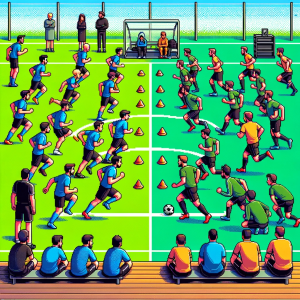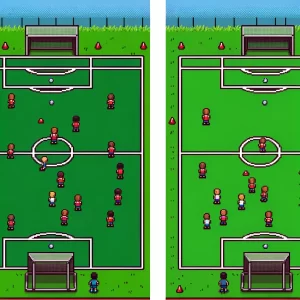
Unveiling Soccer Talent Development: Insights from Systematic Research
The article “What do we currently know about the development of talent? A systematic review in the soccer context” delves into soccer talent development, offering valuable insights for coaches and player development experts. The systematic review categorizes existing research into four quadrants based on whether they are static or dynamic and inter- or intraindividual in their approach.
Current State of Research
Most of the 85 studies analyzed focus on the ‘static-interindividual’ quadrant, which means they look at fixed factors in groups of players to predict future success. These factors include psychological characteristics, physical attributes, practice hours, and more. Such an approach, while informative, often overlooks the dynamic nature of talent development. It assumes these factors are stable over time, which may not be the case.
Dynamic and Individual-Specific Approach
A significant gap in current research is the lack of focus on dynamic and individual-specific processes. Only a few studies explore how talent development is a changing and unique process for each player. This approach considers the interactions between various personal and environmental factors over time. It acknowledges that talent development is non-linear and highly individualized, a concept gradually gaining recognition but still underrepresented in current research.
Implications for Soccer Coaching and Player Development
- Holistic and Dynamic Perspectives: Coaches and development programs should consider adopting more holistic and dynamic approaches to talent development. This involves looking at the player’s growth over time and understanding how different factors interact and change.
- Customized Development Plans: Recognizing the individual nature of talent development, coaches should tailor development plans to each player’s unique needs, strengths, and weaknesses.
- Longitudinal Tracking: Emphasizing longitudinal studies in future research can provide more insights into how talent develops over time. Coaches should track players’ progress across various domains – technical, psychological, physical, and tactical – to better understand their developmental trajectory.
- Embracing Technology: Utilizing modern technology like wearable devices and apps for tracking players’ progress can provide real-time, detailed insights into their development.
- Broadening the Scope: Coaches and researchers should not just focus on static factors like physical attributes but also consider psychological, social, and environmental factors that influence a player’s development.
- Redefining Success: The current focus on professional or elite status as the sole indicator of success in talent development should be re-evaluated. Other forms of success and progress at different levels should be recognized and valued.
Future Directions
Future research should emphasize dynamic-intraindividual approaches, focusing on how various factors interact over time to influence a player’s development. This approach can provide richer and more nuanced insights into the complex process of developing soccer talent.
Blog Summary
The systematic review of soccer talent development research highlights the need for a more dynamic and individualized approach in research and practice. While current studies offer valuable insights, they often overlook the changing nature of talent development. For effective coaching and player development, a shift toward understanding each player’s unique and evolving journey is crucial.



